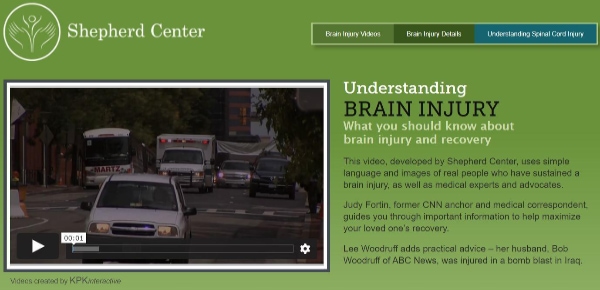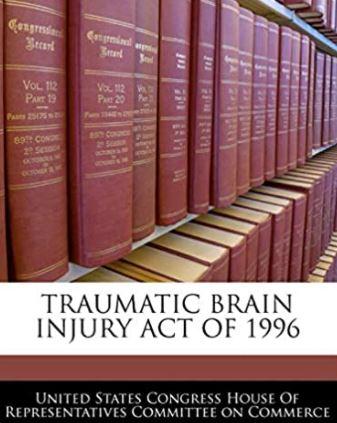Follow Us
If you've experienced a brain injury use the links below to get connected to the information you need. The Person with a Brain Injury section includes resources on what you need to know now, factsheets and guides on returning to school or work. Explore the Mental Health & Wellness area which contains resources on topics like domestic abuse and substance use disorders. In the For Family & Caregivers section provides resources for everyone.
If you are looking for information supporting Service Members who are serving or have served in the Military, check out the "Brain Injury Resource" section.
 Understanding BRAIN INJURY What you should know about brain injury and recovery.
Understanding BRAIN INJURY What you should know about brain injury and recovery.
This video, developed by Shepherd Center in Atlanta GA, uses simple language and images of real people who have sustained a brain injury, as well as medical experts and advocates. Judy Fortin, former CNN anchor and medical correspondent, guides you through important information to help maximize your loved one’s recovery. Lee Woodruff adds practical advice – her husband, Bob Woodruff of ABC News, was injured in a bomb blast in Iraq
- Chapter 1: Introduction and About This Video
- Chapter 2: Brain Injury Basics and Anatomy of the Brain
- Chapter 3: Understanding Traumatic Brain Injury, It's Causes, Effects and Classifications
- Chapter 4: Understanding Non-Traumatic Brain Injury and Stroke, It's Causes and Classifications
- Chapter 5: Practical Advice for Coping with Brain Injury
- Understanding Brain Injury Details


The University of Alabama at Birmingham Traumatic Brain Injury Model System (UAB-TBIMS) maintains this Information Network as a resource to promote knowledge in research, health, and quality of life for people with traumatic brain injuries, their families, and TBI-related professionals. Here, you will find educational materials and information on research activities of the UAB-TBIMS along with links to outside (Internet) information. Although there are many informative commercial (.com) websites, this website only links to information materials originating from educational, organizational, and government entities.
FACTSHEETS: The UAB-TBIMS offers a series of Information Sheets developed through a collaboration between the Model Systems Knowledge Translation Center (MSKTC) and the TBI Model Systems of Care. These fact sheets are written for consumers.
- Understanding TBI Part 1: What happens to the brain during injury and in the early stages of recovery from TBI? | Español
- Understanding TBI Part 2: Brain injury impact on individuals’ functioning | Español
- Understanding TBI Part 3: The Recovery Process | Español
- Understanding TBI Part 4: The impact of a recent TBI on family members and what they can do to help with recovery | Español
- Understanding and Coping With Irritability, Anger, and Aggression After TBI
- Understanding Problem Behavior Changes After Moderate to Severe Traumatic Brain Injury
- Concussion Recovery | Español
- Social Skills After Traumatic Brain Injury | Español
- Vision Problems and Traumatic Brain Injury | Español
- Couples’ Relationships after Traumatic Brain Injury | Español
- Acute Inpatient Rehabilitation | Español
- Memory and Moderate to Severe Traumatic Brain Injury | Español
- Cognitive Problems | Español
- Driving | Español
- Emotional Problems | Español
- Fatigue | Español
- Headaches | Español
- Returning to School | Español
- Seizures | Español
- Sleep | Español
- Vegetative & Minimally Conscious States | Español
- Alcohol & TBI | Español
- Balance Problems & TBI | Español
- Depression | Español
- Sexualty | Español
- Loss of Smell or Taste After Traumatic Brain Injury | Español
- Spasticity after TBI | Español
REHAB TIP SHEETS: These tip sheets offer rehabilitation care providers and consumer caregivers step-by-step instructions and photo illustration on performing common activities.
YWCA of Nashville
24-Hour Crisis & Support HelpLine: 800-334-4628
Domestic Violence Crisis TEXT LINE: 615-983-5170
October is Domestic Violence Awareness Month (DVAM), and we’re participating in and planning events to highlight the crisis of domestic abuse in our community and the resources that exist to help and support survivors. We’re proud to be the largest provider of domestic violence services in the state, with the 65-bed Weaver Domestic Violence Center, 24-Hour Crisis & Support Helpline and Textline, and a state-of-the-art pet shelter for pets of survivors fleeing abuse.
To learn more and sign up for the YWCA of Nashville's monthly newsletter
Brain Injury Association of America
By the Numbers: There is a huge overlap between brain injury and domestic violence, with over 75% of domestic violence survivors sustaining a brain injury as a result of the abuse they endured. And yet, brain injury is often not screened for when survivors receive medical care. Learn more about brain injury and domestic violence here. Understanding Domestic Violence as a Cause of TBI

The Traumatic Brain Injury (TBI) Act was signed into law on July 29, 1996 by President Bill Clinton.
Visit the Brain Injury Association of America to learn more. When the TBI Act was signed, it was the only federal legislation that specifically addressed TBI prevention, research, and service delivery through state grants. Follow us on social media July 29 to learn more about the TBI Act and its history.. Read more about it on this website: https://www.biausa.org/public-affairs/public-policy/traumatic-brain-injury-act



